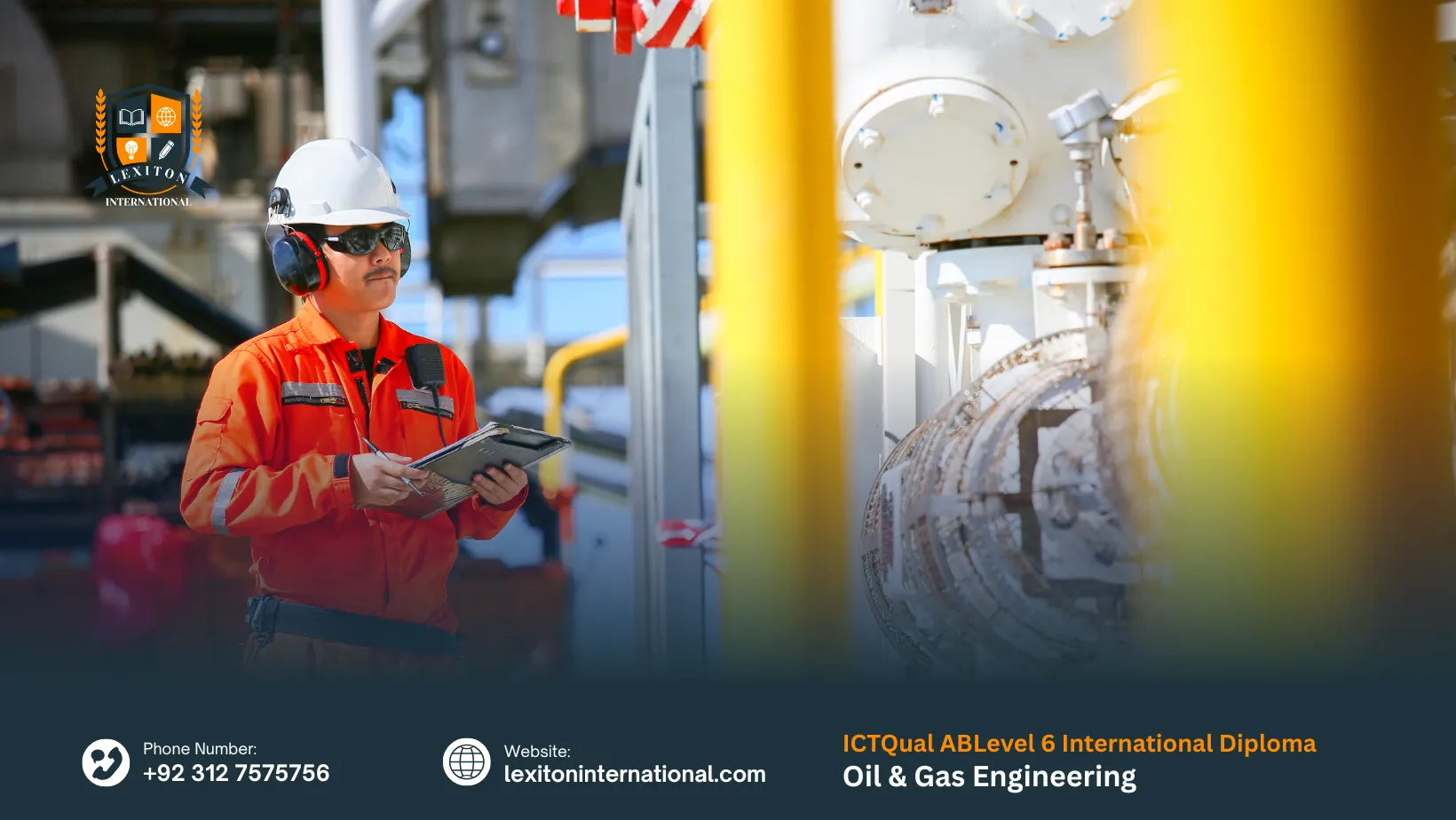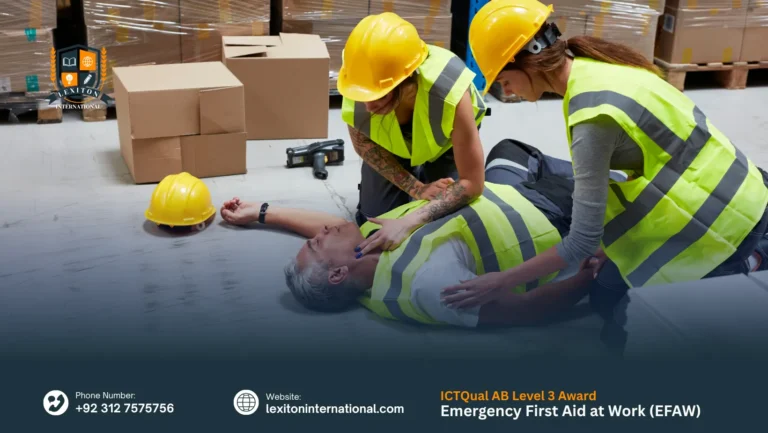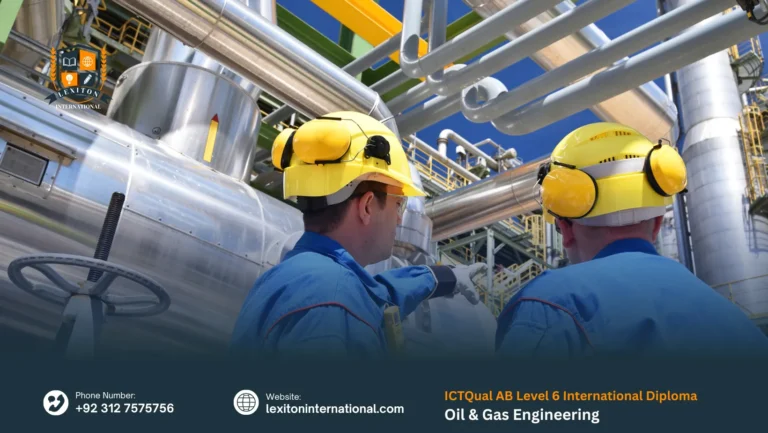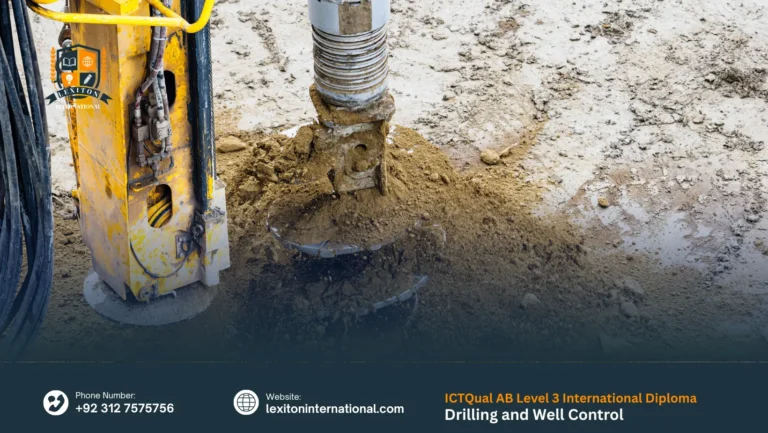The ICTQual AB Level 6 International Diploma in Oil & Gas Engineering is a comprehensive qualification designed to equip learners with advanced technical knowledge and practical expertise in one of the world’s most dynamic industries. This program provides a strong foundation in engineering principles while focusing on the specialized requirements of oil and gas exploration, production, and project management. Learners gain insights into the latest technologies, safety standards, and operational practices that drive efficiency and sustainability in the global energy sector.
Throughout the course, participants will explore key areas such as drilling operations, pipeline engineering, offshore and onshore facility management, and health, safety, and environmental compliance. The curriculum emphasizes both theoretical understanding and real-world application, ensuring that learners are prepared to meet the challenges of complex oil and gas projects. By integrating engineering knowledge with industry-specific practices, the diploma develops professionals who can contribute effectively to large-scale energy operations.
By the end of the program, graduates will be equipped with the skills to take on senior technical and supervisory roles within the oil and gas industry. They will be able to apply engineering solutions to real-world problems, ensure compliance with international standards, and lead teams in high-pressure environments. This qualification not only enhances career prospects but also provides a pathway to further academic progression and professional certifications in engineering and energy management.
To gain the most from the ICTQual AB Level 6 International Diploma in Oil & Gas Engineering, learners are expected to meet specific academic and professional entry requirements. These criteria ensure that participants have the foundational knowledge and practical understanding necessary to succeed in this advanced engineering qualification.
- Age Requirement: Learners should typically be 18 years or older to enroll, ensuring they possess the maturity and comprehension required for advanced technical studies and professional development in the oil and gas sector.
- Educational Background: Applicants should hold a Level 5 qualification, such as a diploma or foundation degree in Mechanical, Electrical, Petroleum, or Chemical Engineering, or a closely related discipline. Candidates with vocational qualifications or equivalent industry experience may also be considered.
- Relevant Industry Experience: Candidates with prior experience in oil and gas operations, engineering projects, plant management, or technical supervision are strongly encouraged to apply. Practical exposure to drilling, production, pipeline, or process engineering will enhance understanding and application of the course content.
- English Language Proficiency: International learners should demonstrate sufficient proficiency in English to comprehend technical documentation, engineering standards, and safety procedures effectively.
- Career Motivation: Applicants are expected to show a strong interest in pursuing a professional career in oil and gas engineering, project management, or technical consultancy. Commitment to safety, compliance, and operational excellence is essential for success in this field.
Mandatory Units
This qualification, the ICTQual AB Level 6 International Diploma in Oil & Gas Engineering, consists of 36 mandatory units.
Year 1 – Foundation in Oil & Gas Engineering
Year 2 – Intermediate Oil & Gas Engineering Practices
Year 3 – Advanced Oil & Gas Engineering and Strategic Leadership
Learning Outcomes for the ICTQual AB Level 6 International Diploma in Oil & Gas Engineering:
Year 1 – Foundation in Oil & Gas Engineering
Principles of Oil & Gas Engineering
- Understand the fundamental concepts of petroleum engineering and energy systems.
- Explore the global oil and gas industry, including upstream, midstream, and downstream sectors.
- Identify key roles, responsibilities, and career paths in oil and gas operations.
- Apply basic engineering principles to energy projects and operations.
Introduction to Petroleum Exploration and Production
- Explain exploration techniques, including seismic surveys and geological analysis.
- Understand production methods and reservoir behaviour.
- Evaluate project feasibility and resource potential.
- Identify environmental and regulatory considerations in exploration and production.
Drilling and Well Engineering Fundamentals
- Understand drilling operations, equipment, and well design principles.
- Analyse well planning, casing, and completion methods.
- Identify common drilling challenges and safety considerations.
- Apply basic calculations for wellbore design and pressure management.
Construction Materials and Methods in Oil & Gas Projects
- Describe materials used in pipelines, rigs, and facilities.
- Understand construction techniques for onshore and offshore projects.
- Assess material suitability for safety, durability, and operational efficiency.
- Apply knowledge to support project planning and execution.
Process Engineering Basics
- Understand fundamental process engineering concepts in oil and gas.
- Analyse flow systems, process operations, and unit operations.
- Apply process calculations for efficiency and safety.
- Explore process monitoring and optimisation methods.
Project Planning and Scheduling in Oil & Gas Engineering
- Develop project plans, timelines, and milestones.
- Identify task dependencies, critical paths, and resource requirements.
- Use scheduling tools for efficient project execution.
- Adjust plans to meet project objectives and deadlines.
Health, Safety, and Environmental Awareness in Oil & Gas
- Understand HSE regulations and best practices in oil and gas projects.
- Apply safety protocols in onshore and offshore operations.
- Conduct environmental impact assessments.
- Promote sustainable and safe engineering practices.
Communication and Stakeholder Management in Energy Projects
- Identify key stakeholders and their expectations.
- Communicate project information effectively using verbal, written, and visual tools.
- Manage stakeholder engagement and feedback.
- Resolve minor conflicts to support project objectives.
Digital Tools and Simulation Software in Oil & Gas
- Apply engineering software and digital tools for design, simulation, and monitoring.
- Use modelling software for process and reservoir analysis.
- Analyse data to improve operational decisions.
- Explore emerging technologies in digital oilfield management.
Financial Management in Oil & Gas Projects
- Interpret financial statements, project budgets, and cash flow reports.
- Apply cost management and investment principles.
- Monitor expenditures and identify variances.
- Support financial decision-making in energy projects.
Quality Assurance and Control in Engineering Operations
- Understand quality management principles for oil and gas projects.
- Implement quality control processes to ensure compliance and safety.
- Monitor project outputs against specifications.
- Recommend improvements for operational excellence.
Legal and Regulatory Frameworks in Oil & Gas
- Understand local and international laws governing oil and gas operations.
- Identify compliance requirements for exploration, production, and distribution.
- Apply legal knowledge to mitigate risks.
- Ensure adherence to environmental, safety, and contractual regulations.
Year 2 – Intermediate Oil & Gas Engineering Practices
Advanced Drilling Techniques and Well Operations
- Analyse complex drilling methods, including directional and offshore drilling.
- Plan well operations with risk and safety considerations.
- Optimise drilling performance and efficiency.
- Apply advanced monitoring and troubleshooting techniques.
Resource Management and Allocation in Oil & Gas Projects
- Manage human, material, and financial resources effectively.
- Analyse resource requirements and optimise allocation.
- Monitor utilisation and productivity across teams.
- Adjust resource plans to meet operational goals.
Process Design and Optimisation
- Design and evaluate process systems for oil and gas operations.
- Apply process simulations to improve efficiency and safety.
- Implement optimisation strategies for production and throughput.
- Identify bottlenecks and recommend process improvements.
Pipeline and Infrastructure Engineering
- Plan and design pipelines, storage, and transport infrastructure.
- Understand construction, maintenance, and safety protocols.
- Evaluate environmental and regulatory impacts.
- Apply engineering principles to ensure efficient and safe operations.
Procurement and Supply Chain Management in Energy Projects
- Plan procurement strategies for equipment, materials, and services.
- Manage supplier relationships and contracts.
- Optimise supply chain operations for cost, time, and quality.
- Mitigate supply chain risks in energy projects.
Project Risk Analysis and Mitigation
- Conduct comprehensive risk assessments for engineering projects.
- Develop mitigation plans for operational, financial, and environmental risks.
- Monitor risk factors and update strategies accordingly.
- Evaluate effectiveness of risk management measures.
Leadership and Team Management in Engineering Projects
- Demonstrate leadership skills in multidisciplinary teams.
- Manage team dynamics and resolve conflicts effectively.
- Motivate and guide team members to achieve project objectives.
- Promote collaboration, accountability, and high performance.
Offshore and Onshore Operations Management
- Plan, supervise, and coordinate offshore and onshore operations.
- Ensure compliance with safety, environmental, and regulatory standards.
- Monitor daily operations and performance metrics.
- Implement operational best practices to improve efficiency.
Sustainability and Environmental Management in Oil & Gas
- Apply sustainable practices in exploration, production, and processing.
- Evaluate environmental impacts and implement mitigation strategies.
- Integrate renewable energy solutions and eco-friendly technologies.
- Promote environmental responsibility in engineering decisions.
Project Monitoring and Reporting in Engineering Projects
- Track project progress against timelines, budgets, and objectives.
- Prepare clear and professional progress reports.
- Analyse data to identify delays or inefficiencies.
- Recommend corrective actions to maintain project alignment.
Problem-Solving and Decision-Making in Oil & Gas Projects
- Apply analytical techniques to resolve engineering challenges.
- Make informed decisions based on technical, financial, and operational data.
- Evaluate alternative solutions for feasibility and impact.
- Document outcomes to support continuous improvement.
Communication and Negotiation Skills in Energy Projects
- Communicate effectively with teams, contractors, and stakeholders.
- Apply negotiation strategies to achieve project objectives.
- Resolve conflicts and facilitate collaboration.
- Present technical information clearly for decision-making.
Year 3 – Advanced Oil & Gas Engineering and Strategic Leadership
Strategic Oil & Gas Project Management
- Develop long-term strategies for complex oil and gas projects.
- Align project objectives with organisational and market goals.
- Evaluate operational, financial, and technical factors for decision-making.
- Apply strategic planning to optimise resource use and project outcomes.
Advanced Production and Reservoir Engineering
- Analyse reservoir behaviour and optimise production methods.
- Apply enhanced oil recovery techniques and production modelling.
- Evaluate production efficiency and operational performance.
- Implement strategies for maximising resource extraction.
Energy Systems and Infrastructure Planning
- Design and manage energy infrastructure for oil and gas projects.
- Integrate power, transport, and pipeline systems for efficiency.
- Address technical, logistical, and environmental challenges.
- Plan infrastructure investments and operations for long-term sustainability.
Innovation and Emerging Technologies in Oil & Gas
- Explore emerging technologies such as digital oilfields, IoT, and automation.
- Evaluate innovative solutions to improve efficiency and safety.
- Apply technology to process optimisation and project management.
- Assess feasibility, ROI, and operational impact of new technologies.
Advanced Risk and Crisis Management in Engineering Projects
- Conduct high-level risk assessments for strategic oil and gas operations.
- Develop contingency and crisis management plans.
- Respond effectively to operational emergencies and disruptions.
- Evaluate risk strategies and refine procedures for continuous improvement.
Contract Management and Legal Compliance in Energy Projects
- Administer contracts and agreements for large-scale projects.
- Ensure adherence to legal, regulatory, and contractual requirements.
- Mitigate risks related to leases, procurement, and service contracts.
- Resolve contractual disputes professionally.
Leadership in Oil & Gas Projects
- Lead multidisciplinary teams in complex projects.
- Foster accountability, collaboration, and ethical practices.
- Mentor and develop team members for professional growth.
- Promote organisational objectives through effective leadership.
Advanced Project Control and Performance Measurement
- Monitor project performance using advanced KPIs and control systems.
- Analyse operational, financial, and technical metrics.
- Implement corrective measures to ensure project alignment.
- Prepare detailed performance reports for stakeholders and investors.
Project Governance and Compliance in Oil & Gas Operations
- Apply governance frameworks to ensure transparency and accountability.
- Maintain compliance with statutory, regulatory, and organisational standards.
- Establish monitoring and reporting mechanisms.
- Review and improve governance practices for operational excellence.
Research Methods and Project Analysis in Energy Engineering
- Conduct research to support evidence-based engineering decisions.
- Analyse technical, financial, and operational data.
- Apply statistical and analytical tools for problem-solving.
- Present research findings in professional reports or presentations.
Capstone Project in Oil & Gas Engineering
- Integrate knowledge and skills from all course units into a practical project.
- Demonstrate competence in planning, execution, and management of oil and gas operations.
- Apply leadership, risk management, and innovation to solve real-world challenges.
- Produce a professional report and presentation of project outcomes.
Professional Development and Career Planning
- Develop a personal career plan aligned with oil and gas engineering.
- Identify opportunities for professional growth and continuous learning.
- Build networking, leadership, and strategic decision-making skills.
- Prepare for senior roles in petroleum engineering, project management, and energy consultancy.
The ICTQual AB Level 6 International Diploma in Oil & Gas Engineering is designed for ambitious individuals who are eager to advance their careers in one of the most vital and fast-paced industries in the world. This program is tailored to meet the needs of learners from diverse backgrounds, whether they are recent graduates, industry professionals, or career changers seeking to specialize in oil and gas engineering.
Engineering Graduates and Diploma Holders
- Individuals with a background in Mechanical, Electrical, Petroleum, or Chemical Engineering
- Recent graduates seeking to specialize in oil and gas engineering
- Diploma holders aiming to upgrade their qualifications to an international level
- Learners who want to bridge academic knowledge with industry applications
- Students motivated to enter the global energy sector
Oil and Gas Industry Professionals
- Technicians and supervisors already working in oil and gas operations
- Employees in drilling, production, or pipeline projects seeking career advancement
- Professionals aiming to transition into QA/QC, project management, or engineering roles
- Workers looking to formalize their industry experience with a recognized qualification
- Staff seeking to enhance technical knowledge for leadership positions
Project Managers and Supervisors
- Individuals overseeing engineering projects in oil, gas, or energy sectors
- Supervisors responsible for plant operations, maintenance, or safety compliance
- Managers aiming to strengthen their technical and project management expertise
- Professionals seeking to improve efficiency and safety in large-scale projects
- Leaders preparing for senior roles in multinational oil and gas companies
Career Changers and Aspiring Engineers
- Professionals from related industries such as power, petrochemicals, or construction
- Individuals seeking to shift careers into the oil and gas sector
- Learners motivated to gain specialized knowledge for international opportunities
- Candidates aiming to build a strong foundation for long-term careers in energy
- Those committed to continuous learning and professional development
International Learners and Consultants
- Professionals seeking globally recognized qualifications to expand career mobility
- Consultants advising oil and gas companies on engineering and safety practices
- Learners aiming to work in international projects across offshore and onshore facilities
- Individuals preparing for roles in regulatory compliance and technical consultancy
- Experts seeking to enhance credibility with advanced industry-focused training
The ideal learners for this diploma are those who are motivated, forward-thinking, and committed to excelling in the oil and gas sector. Whether you are starting your journey, advancing your career, or transitioning into this field, the ICTQual AB Level 6 International Diploma in Oil & Gas Engineering provides the knowledge, skills, and recognition needed to succeed on a global scale.
The ICTQual AB Level 6 International Diploma in Oil & Gas Engineering is not just a qualification—it is a stepping stone toward higher academic achievements, advanced certifications, and senior-level career opportunities. By completing this diploma, learners open the door to a wide range of future progression pathways that strengthen both their technical expertise and professional standing in the global energy sector.
Advanced Academic Pathways
- Progress to Level 7 Diplomas in Oil & Gas Engineering, Project Management, or Quality Control and Quality Assurance
- Engage in specialized research in drilling, pipeline engineering, or offshore operations
- Transition into academic roles such as teaching or training in engineering institutions
- Contribute to technical publications and research in the energy sector
Professional Certifications
- Pursue PMP (Project Management Professional) for leadership in oil and gas projects
- Gain advanced NDT (Non-Destructive Testing) certifications
- Specialize in HSE (Health, Safety, and Environment) certifications for compliance roles
- Enhance employability with multi-disciplinary technical certifications
Career Advancement Opportunities
- Progress into senior roles such as Lead Engineer, Project Manager, or Operations Supervisor
- Take on consultancy positions in oil and gas exploration and production projects
- Lead multidisciplinary teams in offshore and onshore facilities
- Secure roles in multinational corporations managing large-scale projects
- Transition into executive positions focusing on strategic energy development
The future progression opportunities from this diploma are vast and diverse, offering learners the chance to grow academically, professionally, and globally. By building on the strong foundation provided by the ICTQual AB Level 6 International Diploma in Oil & Gas Engineering, graduates can shape rewarding careers and contribute to the advancement of the global energy industry.
Curious About This Course?







